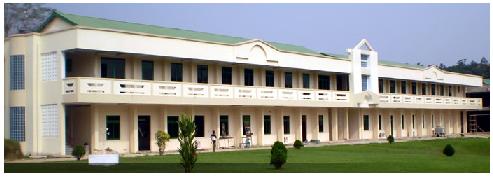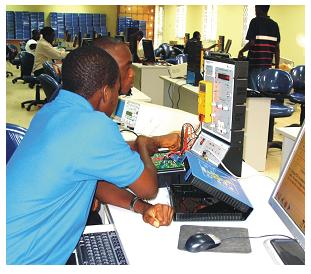University of Mines and Technology (Ghana)

The University of Mines and Technology (UMaT) started as the Tarkwa Technical Institute in November 1952 and became affiliated to Kwame Nkrumah University of Science and Technology (KNUST), Kumasi as Tarkwa School of Mines in1976. In 2001 the School was granted a college status as Western University College of KNUST. UMaT now has full university status and its goal is to provide higher education in mining, technology and related sciences, and to act as a catalyst for the development of mining and technology. Known for its mining related programs UMaT also offers degrees in Electrical/Electronic Engineering, Mechanical Engineering, Mathematics and Computer Science and Engineering. Tarkwa is located on one of the prominent gold belts of Ghana, offering students the opportunity to gain practical experience in their various programmes of study. Visit UMaT’s home page>>
Civic Engagement at UMaT
 UMaT engages with its community in a number of ways:
UMaT engages with its community in a number of ways:
For example, given its expertise in the area of mining, UMaT offers consultancy services for the mining communities in the areas of environmental protection, production scheduling and plant design and operation. Small scale gold mining forms about 10% of youth employment in the country. In a stage of the gold beneficiation process they use mercury to recover gold from concentrates and this results in mercury pollution of water bodies. From a funding from the European Union, UMaT has developed a process for direct smelting of gold concentrates as alternative to the amalgamation process in the quest to prevent mercury pollution.
UMaT also provides technical assistance to a local technology centre (Kristo Asafo Technology Centre), to upgrade the quality of their products and to train their staff.
UMaT has an FM radio station called Dynamite FM. This station is used to educate the local community on environmental issues of mining, HIV, and public hygiene among others.
Read a longer profile of UMaT>>
HIV/AIDS Prevention and Education Program
The HIV/AIDS Prevention and Education Program at the University of Mines and Technology began with an FM radio station called Dynamite FM established in 1998. The station is used to educate the local community on environmental issues, HIV/AIDS, public hygiene, and other issues. The open air broadcast on HIV/AIDS and related problems is presented by experts and students and after the program, listeners are permitted to phone in to ask questions or make contributions. Thus the program is interactive and is community based. The program then expanded to field work where designated students and staff visit mining communities to interact with them; administer questionnaires on HIV/AIDS prevention; put on various seminar discussions, public fora, video presentations and plays to educate the local population on HIV/AIDS prevention; and to distribute condoms in the local mining camps. Since the program’s inception, the HIV infection rate in Tarkwa, Ghana has dropped from over 4% to 2.5%.